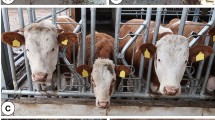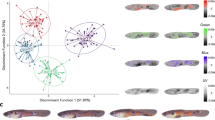Abstract
THE first mutation reported in the Syrian hamster, Mesocricetus auratus, was a recessive type of white spotting which has been designated as piebald1. The new mutation to be described here differs from piebald in two respects : (1) the mutation is inherited as a dominant to normal pigmentation ; and (2) the characteristic spotting pattern produced by the mutation is phenotypically distinguishable. The new mutant gene has been termed ‘white band’ and has been given the symbol Ba. The gene was discovered in the United States in 1957, and stock carrying the gene was imported into Britain during 1959.
This is a preview of subscription content, access via your institution
Access options
Subscribe to this journal
Receive 51 print issues and online access
$199.00 per year
only $3.90 per issue
Buy this article
- Purchase on Springer Link
- Instant access to full article PDF
Prices may be subject to local taxes which are calculated during checkout
Similar content being viewed by others
References
Foote, C. L., J. Hered., 40, 401 (1949). Orsini, M. W., ibid., 43, 37 (1943).
Author information
Authors and Affiliations
Rights and permissions
About this article
Cite this article
ROBINSON, R. White Band, a New Spotting Mutation in the Syrian Hamster. Nature 188, 764–765 (1960). https://doi.org/10.1038/188764a0
Issue Date:
DOI: https://doi.org/10.1038/188764a0
This article is cited by
-
Genetic studies of the Syrian hamster v. white band
Heredity (1962)
Comments
By submitting a comment you agree to abide by our Terms and Community Guidelines. If you find something abusive or that does not comply with our terms or guidelines please flag it as inappropriate.



